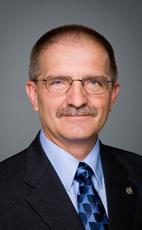Mr. Speaker, I am very pleased to take part in this debate for several reasons. The motion before us involves an issue of particular importance since it concerns the fate of Canadian Forces veterans and former members of the RCMP. The motion provides us with the opportunity to discuss a subject that our government takes very seriously. It also allows us to illustrate the measures already in place that ensure the well-being of those brave men and women who wear a uniform.
By tabling the motion, the member is implying that our government has been neglecting our responsibilities with respect to our veterans and their families. Nothing is further from the truth. Many other members of our government have talked about the wide array of programs and supports available to veterans and how we continue to increase spending in this area, but so far, no one has touched on the issue of mental health support. I would like to focus my remarks on this topic as I feel it is the area in which we have provided exceptional programs and services to Canada's veterans.
Veterans Affairs Canada, in collaboration with the Department of National Defence, has created a network of 17 mental health clinics across the country to offer specialized services to veterans, and Canadian Forces and RCMP members suffering from operational stress injuries caused by their service. There are currently ten such clinics administered by Veterans Affairs Canada, nine of which are out-patient clinics located in Fredericton, Quebec, Montreal, Ottawa, London, Winnipeg, Calgary, Edmonton and Vancouver. The tenth is the Residential Treatment Clinic for Operational Stress Injuries at Ste. Anne’s Hospital. I will take a moment to talk about how these operational stress injuries, OSI, clinics work.
While continuing to live in their communities, veterans attend appointments at the OSI clinics. They are offered a clinical assessment and a variety of treatment options, including individual therapy, group sessions, psycho-educational sessions, and other resources. The clinics' teams are made up of psychiatrists, psychologists, social workers, mental health nurses, and other specialized clinicians who understand the experiences and needs of veterans. Loved ones can be involved in the treatment and eligible family members can also receive services. Treatment approaches in OSI clinics are based on best practices and are tailored to meet each client's needs. The team works closely with other health care or community organizations to ensure appropriate follow-up as needed. A referral to other centres may be part of the treatment process depending on the needs of the client. When there are difficulties with addiction or substance abuse, these centres provide specialized treatment.
Telehealth services help ensure that veterans are provided with easier access to emotional support when they need it. Coast to coast support is available to help these brave men and women overcome challenges of complex mental health injuries.
I know the Canadian Forces offers similar support as well through its seven operational trauma and stress support centres.
These new services significantly enhanced the country's support to veterans and their families living with mental health conditions. Today there are more services and programs available than ever before to support them. There are also more front-line health specialists than ever before to ensure the support is effective.
Integrated personnel support centres located on 24 bases and wings give staff from Veterans Affairs Canada and DND the opportunity to offer early intervention and support. Working side by side, the front-line employees from Veterans Affairs Canada and DND develop personalized case plans for each individual veteran to support his or her re-establishment into civilian life.
The two organizations have also created a very successful peer support network called the operational stress injury social support program. Specially trained peer support coordinators who have first-hand experience with operational stress injuries and the loss of loved ones provide vital personal support to Canadian Forces members, veterans and their families.
For those in distress, assistance is available 24 hours a day, 7 days a week through the VAC assistance service line. Veterans and their families can access counselling and referral services, including support for mental and emotional health concerns. In addition, more than 4,000 community mental health providers are registered to provide care, support and professional counselling services in veterans' communities.
There are over 200 clinical care managers registered across the country who are dedicated to providing intensive support, daily if required, to veterans with complex needs. There are health professionals, such as occupational therapists and mental health nurses, who build strong support relationships with veterans and their families. They help them follow through on their case treatment plans, help them link to the community resources they may need and connect them with health professionals who can help them and their families with recovery.
Nearly 15,000 veterans suffering from mental health problems receive some form of assistance or support from the department. Our government takes it very seriously. I want to assure veterans and all members of the chamber that we are fully aware of the importance of our responsibility in this regard. We are not neglecting our duty to these brave men and women. Their dedication throughout this country is a constant reminder that our government, in turn, must serve them with equal devotion.

